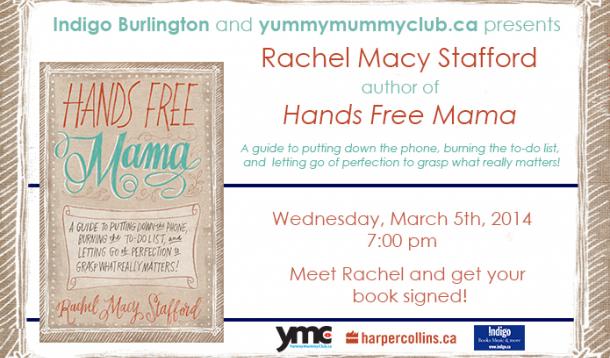
Attention parents in the GTA and Southwestern Ontario areas: we hope you can join Rachel Macy Stafford, author of Hands Free Mama, and myself for an inspirational parenting chat at Indigo Burlington.
This event will be held Wednesday, March 5th at 7pm inside the Indigo Burlington store at 1250 Brant St, Burlington.
Motivated to not get scooped up by meaningless distractions, Stafford began practicing strategies to prevent these interferences from taking any more time away from her children. Determined to put her busy life in check, she let go of perfection and began mindfully engaging in connections. Her happiness and her children’s behaviour have improved as a result.
As the host of this evening, which includes my interview with Stafford and a book-signing opportunity, I will ask Stafford about her journey and how she was able to change her busy-ness to reconnect with her children. We will chat about her favourite strategies for staying in the moment and letting go of perfection.
Do you have a question for Rachel Macy Stafford? Please do let me know and I will ask it on your behalf. You can post that in the comments below or over on my Facebook page.
A psychotherapist colleague, who thought we might enjoy collaborating, first introduced me to Hands Free Mama and Rachel Macy Stafford. She was right! Stafford had written an emotional, wildly successful post entitled, “The Bully Too Close To Home” and contacted me about writing a follow-up to provide strategies for responding more peacefully and positively to children. I was happy to do that because I know many parents want to be less hard on their children, but may not know exactly how to do that. The article I wrote to address this is called, “Seven Steps To Being Less Hard On Our Kids.”
Shortly after these two posts were published, I received my advanced copy of Hands Free Mama in the mail—so exciting! I believe parents will benefit from reading this book by gaining inspiration to improve connections and concrete strategies to putting our children at the top of our priority list.
I hope you can make it on Wednesday, March 5th!

If you are a follower of my Facebook page, you may remember reading these words: “To all the mothers staring out the window with tears in your eyes, wondering how you are going to make it through the day — yet you do get through to nighttime — please know how capable and brave you are.” That was me. I was staring out the window at 8am with tears in my eyes not sure how I was going to get my two young children to school on time and myself through the day. But I knew I would. I knew I was going to summon some energy from somewhere and pull it off, and so did many, many other parents that day. Parents are really more capable than we give ourselves credit for.
The thing is, there wasn’t really much to be sad about. My life is wonderful and I have an amazing husband who is my buddy, business partner, and helper. There are some stressors but nothing really overwhelming. I really didn’t know why I was sad — I just couldn’t stop the tears.
One day I just sat down on the sofa and cried — a lot — for no reason. Instead of doing what I typically do as a psychotherapist, which is to jump into solving mode to “get myself out of this,” I just allowed myself time to cry.
I did this because I had faith that “this too shall pass.” Actually, maybe it was more of an experiment; I wondered what would happen if I just surrendered to my sadness and didn’t try to fix it. I was going to let this happen for two weeks before planting myself in the office of a trusted helper, which is what I suggest you do, too. If you are losing sleep, feeling overwhelmed and weepy, and not sure how to pull yourself out of your slump after about two weeks (or sooner if need be), it is time to ask for professional help.
Not surprisingly, it did pass. I witnessed some amazing things with my children, and remembered some basic tenets of allowing emotions to pass through us, which I’d like to share with you.
Children are loving, empathetic, caring little people — give them an opportunity to empathize with you.
Just when I felt done with making another snack, zipping another coat, or using clever words instead of my sour inside voice, I saw a wonderful side of my children. For example, one day while sitting at the kitchen table with teary eyes, my younger son, without asking for any help (which is really a miracle), changed into his “fancy clothes,” figured out how to play a song I like on the stereo, found his toy microphone, smiled, and starting singing like no one was watching. I momentarily cried harder but then suddenly felt like a weight had been lifted. He knew just what to do. I would love to hear stories of when your children helped you through tears. Please go ahead and post them either on my Facebook page or in the comments below.
I was reminded to: Be emotionally honest in front of my children, and give them an opportunity to empathize with me. Show your children what it looks like to have big feelings and how to help yourself when that happens. If you aren’t sure how to help yourself, also be honest about that and share with your children (age-appropriately) how you are seeking the help you need. Oh, and when you are feeling very angry, go ahead and do that in front of your kids, but make sure not to be scary with your angry feelings. Try growling, rubbing your hands, and just saying “I’m angry.”
When we take the risk to admit feeling sad, scared or angry, people want to help.
Open up to your partner, friend, sibling, or anyone you feel safe around to be vulnerable with big feelings. I was so concerned with not complaining or being a “negative nelly,” that I wasn’t being honest with how I felt. When I finally did that, the outpouring of support was overwhelming. There is someone out there who wants to hear you. I invite you to take the risk of finding that person.
Big feelings are fluid — they will not stay if we give them an opportunity to move along.
Have you ever said, “I don’t have time for this sh*t!”? Life has a way of making us have time for “this sh*t,” if we refuse to, doesn’t it? The more we try to avoid our big feelings, that important conversation, or our overwhelming stress, the more it will press on us. It is normal to have big feelings — what we do with those is so important. When we allow them to move along safely, we can “process” the sadness, anger or fear and learn from that experience. When we try to fight intense feelings, they can sink us, turn us into cranky wrecks, and make our bodies hurt. (An excellent book explaining how feelings process is called THE WHOLE-BRAIN CHILD by Dr Dan Siegel and Tina Payne Bryson, PhD)
If you aren’t sure how to allow or process big feelings, I suggest contacting a trusted counselor or psychotherapist for help. You could also visit your local bookstore and look for a book that seems to jump out at you.
Write, dance, sing, draw or shout it out.
Journaling, drawing, listening to or singing a song you feel connected with are excellent ways to move feelings through safely. If you aren’t sure how to start journaling, I suggest getting a blank page and writing “I am angry because…” / “I am sad because…” or “I really need…” at the top of the paper and see what comes out. Don’t censor yourself! Allow swears, the naming of names, and the works to flow out. You can always burn the page safely afterward if you are concerned others might see it.
If you are still breathing, there is still hope.
There is always hope and always some way for things to improve, even if we can’t see it in that moment — trust that. We now have so much wonderful information about parenting, relationships and communication. It is possible to heal open wounds, repair strained relationships, and thrive while raising young children. Keep breathing and carry on bravely.
If you would like some pointers on how to empathize with your children when you are feeling tapped out, here are my suggestions for doing that. And this is what I have learned to get out of survival mode and into thriving.
Photo — iStockphoto.com

A parent submitted a question to this website, and I will answer it here in case any other parents have a similar one.
Q: My eight-year-old continues to lie. For example, if I ask if she has eaten breakfast, she says “yes” when she really hasn’t. When I ask if her homework is done, she says, “yes” – but it isn’t. This is going on and on, and has been since she was four. I have talked to her about trust, disciplined her by taking away dessert/ TV/ video games/ or her favourite things. Why does a child do this and what is the best course to follow to correct this behaviour?
A: Lying is often seen as a behavioural situation that needs to be fixed, however I look at it more as a symptom of a larger problem. What that underlying problem is will take a bit of detective work and thought, which is where I suggest parents begin when trying to put an end to lying. The issue could be as small as the child being temporarily distracted and not really hearing what the parent is asking, to using avoidance tactics to try and get out of a mistake.
The first question to ask is, “Does my child feel safe enough to tell the truth?” What have been the consequences of telling the truth when a mistake has been made in the past? If punishments have been used when a child comes clean, that child might feel too scared to admit a mistake. The goal is to not make lying a better alternative than getting punished for admitting wrong-doing.
The next questions for parents to ask are on the topic of connection and attachment:
“How is my relationship with my child?”
“Am I telling my child what to do too much?”
“Is my child’s attachment tank full or empty?”
“Does my child feel connected to me?”
Marilyn Price-Mitchell, a Developmental Psychologist, offered some great insight when I spoke with her about the topic of lying with teens. I believe her words apply to younger children as well. She said, “Teens do not lie to people with who they have positive ‘relational experiences.’ These are relationships where they feel seen, feel felt and feel understood. These kinds of relationships actually change the way our brains are wired to care for and respect others. When teens don’t have this kind of relationship with parents, they feel disconnected. It’s easy to lie when you feel disconnected because you have nothing to lose.” You can read some of her excellent articles over at www.rootsofaction.com.
Examine the relationship with your child: does your child feel seen, felt and understood by you, as Price-Mitchell mentioned? If you believe that answer could be “no,” think about how you can build a relationship with your child to really demonstrate that she matters. Turn your love into action.
Finally, examine how you are handling the situation. Is there open communication?
To the mom who submitted the question, I imagine that you must be frustrated with your child’s responses and I can see why you tried taking things away to change the behaviour. I’m sure you have discovered that this likely won’t stop the lying, and may actually make it worse. Children can shut down, go into defensive mode, or get very angry with parents when things they love get taken away. Please do not feel that your child is trying to hurt you. I bet she just isn’t sure what to do when you ask if she has done something when she knows she has not, and will likely disappoint you.
Here is a suggestion for what to do when you believe your child has done or not done something properly. For the common question, “Did you do your homework?” parents can address this with the following steps:
1) Do not set the child up to lie. Don’t ask a question — make a statement about what you see.
“I see your homework pages are still blank.”
2) Identify what the child likely wanted to accomplish.
“I bet you wanted to finish that work.”
3) Use friendly and firm limits.
“I know you probably wanted to finish your homework, but I see that the pages are still blank. How can I help you to get that done? Do you have a question?” You could also use a WHEN/THEN technique like this, “When you are finished your homework, then I’ll be ready to read a book with you.”
If you have been using threats, bribes, reward charts or harsh punishment with your children and would like to change that, I suggest these books: IF I HAVE TO ASK YOU ONE MORE TIME… by Amy McCready, and PEACEFUL PARENT, HAPPY KIDS by Laura Markham, PhD.
Also, I continually post free parenting resources on my Facebook page.
Photo -- www.iStockphoto.com